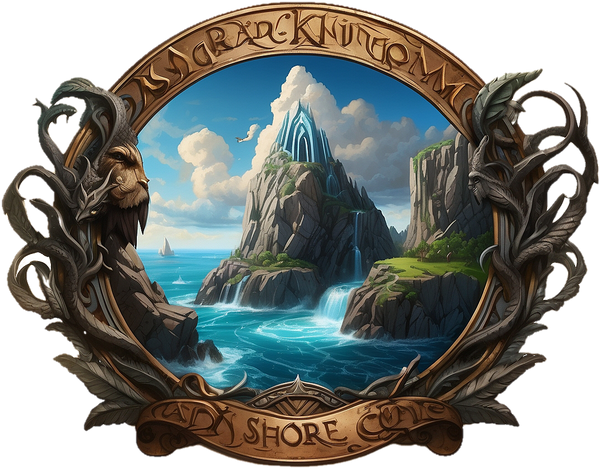Viking Tales: The Trial of the Shield-Born
Share
They called him Shield-Born not because he wielded one, but because he had been found beneath one.
The night his village fell, raiders torched the longhall and shattered the gates. Only the war-chief’s last act, casting his battered shield over the body of a child, kept that boy alive. When the flames cooled and the dead were counted, the child rose from beneath the charred round of oak and iron. Silent. Soot-stained. Alone.
The survivors named him Brandr — not after fire, but after the mark it leaves.
He grew in the shadows of others' grief. Fostered by warriors, trained in silence, sharpened not by praise but by expectation. His hands learned the weight of axe and blade before they learned the gentleness of another’s touch. He spoke little. But when he did, his voice was steel.
The Code and the Flame
The village held to the old ways. The Nine Virtues. The Viking code. Courage. Truth. Honor. Fidelity. Discipline. Hospitality. Self-Reliance. Industriousness. Perseverance. They carved them not just in wood and stone, but into their children. To live outside them was to be nothing.
And Brandr, the Shield-Born, lived within them too well.
At sixteen, he had bested every man in the ring. At seventeen, he hunted alone in the snowfields, returning with wolves draped across his shoulders. At eighteen, he was offered a place at the jarl’s side — but refused.
“The code doesn't live in halls,” he said. “It lives in trials.”
So he set out to find one.
The First Trial: The Flame That Lies
In the valley of Myr, he met a woman who spoke in riddles and walked with a staff made of burned birch. She told him of a cave where voices echoed that were not one’s own — a fire that tested truth by showing what the heart wanted to believe.
Brandr descended.
Inside, the walls pulsed with heatless flame. Figures formed in the fire — his father, arms open; his mother, smiling by a hearth. Friends long dead called him to rest. But he did not kneel. He did not cry.
Instead, he whispered, “You are not the truth.”
The fire screamed, flickered, and went out.
When he emerged, the woman nodded. “You carry no lies in your blood. But there are harder trials than truth.”
The Second Trial: The Iron King
Further north, he crossed into a shattered kingdom ruled by a man clad in blackened steel, called the Iron King. This king had outlawed the code. No man could speak of fidelity. No woman could claim honor. The people bowed not from respect, but from fear.
Brandr challenged him not with words, but with a simple act: he helped a beggar.
When the guards came, he stood.
They bound him, brought him before the Iron King. "You defy the law with kindness?" the king spat.
“I defy no law. I live by a greater one.”
“They will break you.”
Brandr smiled. “Then they will learn what cannot be broken.”
They lashed him to the post and raised the whip. The first strike opened skin. The tenth spilled blood. But he did not cry out. When the blade cracked for the thirtieth time, the guards faltered. By the fiftieth, they dropped their weapons. And by the end, the king was gone, vanished in the night, as if a man who could not command obedience without fear had never truly ruled.
The people called him King-Breaker, but he answered only to Shield-Born.
The Final Trial: The God Without Shadow
Beyond the fjords, in the place where light lingers but never warms, he found a hill topped with stones and runes — a god’s graveyard, they said. And at its center, a figure sat: tall, cloaked, one eye bound in cloth, the other staring into the wind.
“Odin?” Brandr asked.
“No,” the figure said. “Only a reflection. A test.”
The god-shaped shadow rose.
“I am what you become if you worship strength alone. If you walk the code for pride, not purpose.”
The battle was not with fists, but with selves.
The shadow moved like memory, every strike a doubt, every parry a whisper of arrogance. Brandr fought not with rage, but restraint. He could not overpower it. But with each moment of mercy, each refusal to strike low or cheat, the shadow faded.
When it vanished, the hill was silent. Only his own heartbeat remained.
The Return
Brandr returned not with trophies, but with eyes that saw more than before.
He no longer needed to prove his strength. He was the strength, the kind that shields rather than strikes. That holds the line, not for glory, but because someone must.
He became a skald’s tale, a fireside whisper. The man who walked the code until the code walked with him. The Shield-Born who never drew his blade in anger, never lied for comfort, never broke for power.
And when he finally vanished, into mist, into myth, into the heartbeat of the land, they say the shield he was born beneath still hangs above the old longhall. Cracked. Charred. Untouched since the fire.
But if you listen on cold nights, you can hear it creak, not from age, but from memory.
The code remembers those who keep it.
